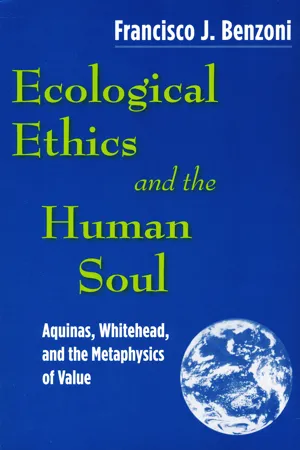
Ecological Ethics and the Human Soul
Aquinas, Whitehead, and the Metaphysics of Value
- English
- PDF
- Available on iOS & Android
Ecological Ethics and the Human Soul
Aquinas, Whitehead, and the Metaphysics of Value
About this book
In Ecological Ethics and the Human Soul: Aquinas, Whitehead, and the Metaphysics of Value, Francisco J. Benzoni addresses the pervasive and destructive view that there is a moral gulf between human beings and other creatures. Thomas Aquinas, whose metaphysics entails such a moral gulf, holds that human beings are ultimately separate from nature. Alfred North Whitehead, in contrast, maintains that human beings are continuous with the rest of nature. These different metaphysical systems demand different ethical stances toward creation.
Benzoni analyzes and challenges Thomas's understanding of the human soul, his primary justification for the moral separation, arguing that it is finally philosophically untenable. The author finds promising the alternative metaphysics of Whitehead, for whom human beings are a part of nature—even if the highest part; all creatures have a degree of subjectivity and creativity, and thus all have intrinsic value and moral worth, independent of subjective human valuation. Further, though there is difference, there is no moral gulf between God and the world. God is truly affected by the experience of creatures. Benzoni argues that if this vision of moral worth is articulated with sufficient force and clarity, it could help heal the human relation to our planet.
Frequently asked questions
- Essential is ideal for learners and professionals who enjoy exploring a wide range of subjects. Access the Essential Library with 800,000+ trusted titles and best-sellers across business, personal growth, and the humanities. Includes unlimited reading time and Standard Read Aloud voice.
- Complete: Perfect for advanced learners and researchers needing full, unrestricted access. Unlock 1.4M+ books across hundreds of subjects, including academic and specialized titles. The Complete Plan also includes advanced features like Premium Read Aloud and Research Assistant.
Please note we cannot support devices running on iOS 13 and Android 7 or earlier. Learn more about using the app.
Information
Table of contents
- Cover
- Half title
- Title page
- Copyright
- Dedication
- Contents
- Acknowledgments
- Introduction
- PART I: Created Goodness and Moral Worth
- PART II: The Human Soul
- PART III: The Unity and Moral Worth of All Creation
- Conclusion
- Appendix A: Spiritual Change and Materiality
- Appendix B: God’s Nature
- Notes
- Bibliography
- Index